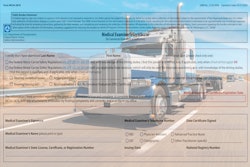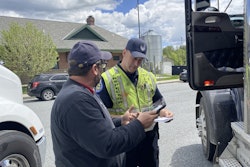Trucking news and briefs for Thursday, June 26, 2025:
Congressional letter asks FMCSA to issue HOS waivers before emergencies hit
U.S. Reps. Mike Bost (R-Illinois) and Mike Collins (R-Georgia), joined by 30 House colleagues, penned a letter earlier this month to the Federal Motor Carrier Safety Administration urging relief from hours-of-service (HOS) regulations for truck drivers in advance of natural disasters and emergencies rather than after they occur.
The lawmakers called for an internal plan that provides clear and consistent HOS exemptions to ensure the uninterrupted flow of fuel and supplies during times of emergency.
“When communities are staring down the threat of a dangerous emergency, the last thing they should have to worry about is ready access to fuel for their homes and vehicles,” said Bost. “I grew up in a family trucking business; I know red tape and delays at the federal level often make it harder for truckers to do their jobs and deliver their product when it matters most. This commonsense policy change will help keep families safe and spur a quicker recovery during severe weather and supply chain disruptions.”
FMCSA currently has the authority to issue emergency declarations under federal law, but in many cases, relief is only granted after a disaster has already impacted a region, authors of the letter noted. This can create confusion for multi-state fuel suppliers and delay critical deliveries.
The letter urges FMCSA to take steps to provide consistent, advanced regulatory relief, particularly in cases where severe weather events or emergencies are predicted, so that fuel marketers and truck drivers can better prepare and respond without unnecessary regulatory barriers.
Specifically, the letter requests that FMCSA:
- Develop internal guidance to facilitate federal declaration of an emergency and trigger automatic relief at least five days before a reliably predicted disaster or emergency
- Implement agency policy on automatic regional relief to promote uniformity in disaster and emergency response
[Related: Disaster-proofing your fleet's business-critical systems]
CarriersEdge launches new English language assessment for drivers
Out-of-service enforcement of the English-language requirements within the Federal Motor Carrier Safety Regulations officially resumed Wednesday following an executive order by President Donald Trump and the Commercial Vehicle Safety Alliance voting to return English language proficiency (ELP) as an out-of-service violation earlier this year.
With that enforcement returning, online truck driver training provider CarriersEdge has released an online English Language Proficiency Assessment to help motor carrier prepare for enforcement of the regulation.
“Many of our customers have contacted us to say they are very worried about the new enforcement rules and the ambiguity regarding how they will be applied,” said Jane Jazrawy, CarriersEdge CEO. "The easy-to-administer assessment is a diagnostic tool carriers can use to understand what sort of risk they are facing with their drivers.”
The test, available to all CarriersEdge customers, utilizes a series of visual cues and audio questions to assess a driver's ability to understand and respond to the types of questions they may encounter during a roadside inspection. It includes identifying the meaning of various road signs and responding to questions they may be asked. The results can provide carriers with insights into how their drivers may perform in a real-world scenario.
According to guidance released by the Federal Motor Carrier Safety Administration last month, inspectors will begin all inspection interactions in English, and if initial contact with the driver indicates that the driver may not understand the initial instructions, the inspector should conduct an ELP assessment to evaluate the driver’s compliance with 49 CFR § 391.11(b)(2). That assessment, according to FMCSA, should consist of a driver interview and, if necessary, a highway traffic sign recognition assessment.
CarriersEdge noted that passing its assessment is not a guarantee that a driver’s English proficiency is sufficient to pass an actual roadside inspection and avoid being placed out-of-service and advised that carriers evaluate their risk and plan accordingly.
[Related: FMCSA will use 2-step evaluation for enforcement of English-speaking CDL requirement]
Repair shop owner charged for emissions deletes
Matthew Caroluzzi and his Pennsylvania-based business Matt’s Heavy Duty Mobile Diagnostics and Truck Repair and Heavy Towing (Matt’s HD) were charged earlier this month with nine counts of violating the Clean Air Act and one count of conspiring to violate the Clean Air Act and aiding and abetting.
According to the Department of Transportation Office of Inspector General, Matt's HD was a certified vehicle safety inspection station in Pennsylvania that performed repairs and maintenance on commercial motor vehicles, including medium- and heavy-duty diesel trucks and other vehicles.
Caroluzzi, Matt's HD, and others allegedly performed hundreds of “deletes” of hardware components of commercial motor vehicle emission control systems and software “tunes,” OIG said. Hardware alterations to emissions control systems are often referred to as “deletes” and tamper with the monitoring function of diesel trucks' on-board diagnostics (OBD) monitoring systems. OIG said this enabled numerous vehicles to function while emitting higher levels of air pollutants into the atmosphere.
Caroluzzi and his co-conspirator employees recorded “deletes” and “tunes” as “deletes” on work orders and invoices, but later allegedly disguised the illegal conduct by using code words such as “reprogram,” “re-flash,” and “ECM repair” on Matt's HD paperwork. The act of rendering an OBD system ineffective is commonly referred to as “tuning” or “flashing.”
Caroluzzi, Matt's HD, and co-conspirators benefitted financially by collecting approximately $1 million in fees from customers for performing, and aiding and abetting the performance of, deletes and tunes on more than 700 diesel-powered trucks.











